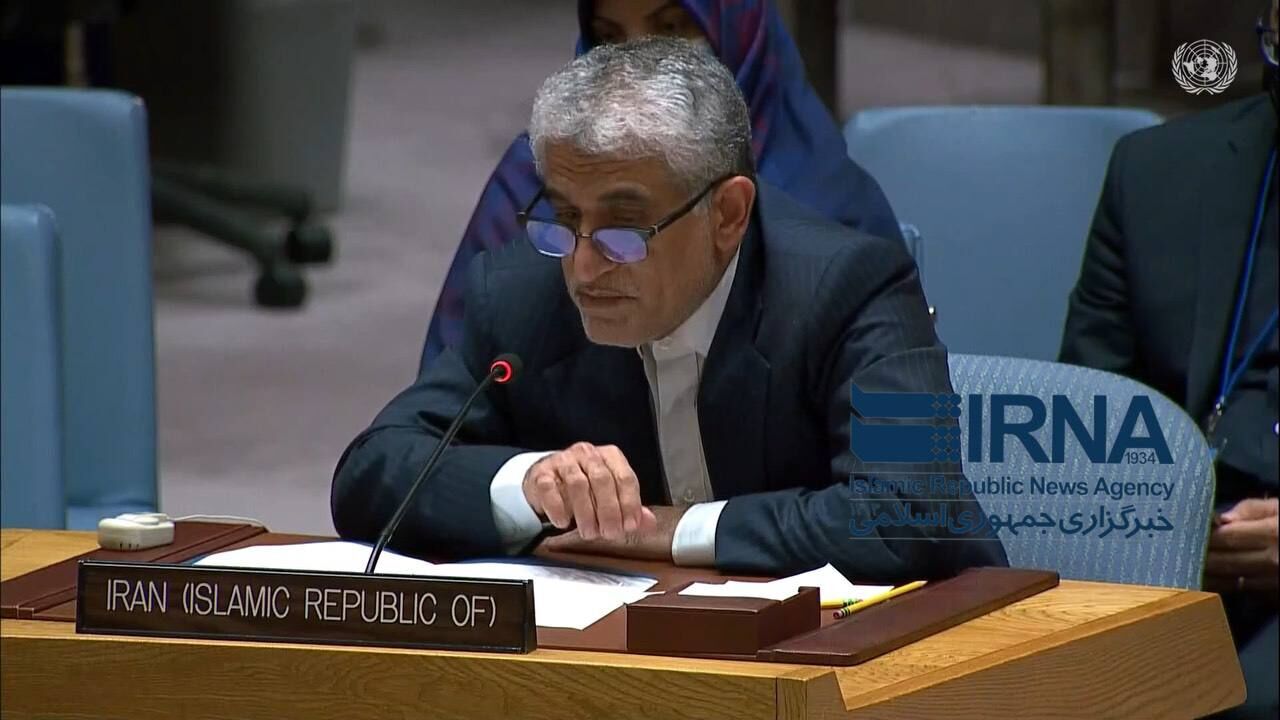 Ambassador and Permanent Representative of the Islamic Republic of Iran to the United Nations has called on the UN to strongly and openly condemn the Wednesday terrorist attack on a holy place in Shiraz, a southern Iranian city.
Ambassador and Permanent Representative of the Islamic Republic of Iran to the United Nations has called on the UN to strongly and openly condemn the Wednesday terrorist attack on a holy place in Shiraz, a southern Iranian city.
Amir Saeid Iravani issued the call in a statement before the United Nations Security Council on “Maintenance of International Peace and Security” in New York on Wednesday (October 26).
The ambassador expressed sympathy with the family members of the victims of the terrorist attack which killed at least 15 people and wounded 21 others.
The full text of the ambassador’s remarks is as follows:
In the name of God, the compassionate, the Merciful
I thank you, Mr. President, for convening this meeting.
Before I begin, I would like to express my sorrow and sadness that our people and my Country were today targeted by a terrorist attack, whereby the initial reports, a couple of armed gunmen attacked the holy religious site known as the Shah-e-Cheragh Shrine in Shiraz, with at least 15 people martyred and injured 21 others.
This is a heinous terrorist attack on civilians, including children and women. Iran once again condemns terrorism in all its forms and manifestations as a real and grave threat to international peace and security and it is expected that the Security Council condemn such a heinous crime explicitly and strongly.
Mr. President,
First and foremost, I would like to clarify and emphasize that Iran’s participation at this meeting is confined to the matters raised in relation to Resolution 2231 (2015), which is directly related to and affects Iran. As a result, I feel compelled to attend this meeting in order to elaborate on Iran's position on the claims made against my country in the context of UN Security Council Resolution 2231.
Certain Security Council members, including the United States, accuse others of violating Resolution 2231 (2015), despite the fact that these certain states continue to violate all of their explicit legal obligations under that same resolution. The main example is the illegal withdrawal of the United States from the Joint Comprehensive Plan of Action, which is still openly used as "bargaining leverage" today. Without a doubt, continuing such unlawful acts violates international law, the United Nations Charter, and Security Council Resolution 2231. (2015).
Now, in yet another desperate effort, these states have attempted to establish an entirely artificial linkage between Security Council Resolution 2231 (2015) and the use of unmanned aerial vehicles in the ongoing conflict in Ukraine by disseminating unsubstantiated and erroneous information, raising inaccurate assumptions, and resorting to totally flawed, arbitrary, and misleading interpretations of that resolution.
Mr. President, let us be clear and elaborate on Iran's position on Resolution 2231,
- The claim regarding the violation of paragraph 4 of Annex B to resolution 2231 (2015) is an erroneous, arbitrary, and yet misleading interpretation that contradicts the letter and spirit of that paragraph. That paragraph clearly refers to restrictions on items, materials, equipment, goods, and technology “that the State determines could contribute to the development of nuclear weapon delivery systems”. As has been stated in our letters on 19 and 24 October addressed to the Security Council and the Secretary-General, Iran has never produced or supplied, nor does it intend to produce or supply, items, materials, equipment, goods, and technology that could contribute to the development of nuclear weapon delivery systems.
- With regard to the request to the Secretariat to conduct what is referred to as an investigation, the resolution itself provides no legal basis for such an investigation. Furthermore, the President of the Security Council's Note dated 16 January 2016 (S/2016/44), clearly specified the mandate of the Secretariat regarding the resolution, which is only administrative support. The Secretariat is tasked with "assisting the facilitator in the organization and staffing of informal Security Council meetings related to the implementation of Resolution 2231 (2015)," "managing all incoming and outgoing communications related to the resolution's implementation," "drafting correspondence, speaking notes, and briefings of the facilitator related to the resolution's implementation," and "maintaining and archiving all information and documents relating to the resolution."
- Having said that, Mr. President, I would like to emphasize once more that any misuse of the functions described in Note S/2016/44 for conducting the so-called “investigation” requested would be illegal and in clear violation of the Secretariat’s mandate.
Finally, Mr. President, I would like to reiterate Iran's clear and consistent position on the conflict in Ukraine.
Since the beginning of the conflict, Iran has maintained a position of active neutrality and has emphasized that all UN Member States must fully respect the purposes and principles enshrined in the United Nations Charter as well as international law, including sovereignty, independence, unity, and territorial integrity.
Iran has consistently advocated for peace and an immediate end to Ukraine's conflict. Despite bilateral defense cooperation agreements, Iran has never provided the parties with weapons for use in the Ukraine conflict, either before or after the conflict.
Aside from the legal and political positions, Iran believes, from a moral point of view, that providing military support could not be intended to end the war, but rather to escalate it, increasing damage and destruction, and causing more suffering for civilians.
That is why Iran has urged the parties to uphold their obligations under international humanitarian law and conduct consultations to protect civilians and critical infrastructure from military targets or attacks.
At the end, my delegation totally rejects all unfounded and politically motivated allegations made by certain states against my Country at this meeting.
I thank you, Mr. President.
